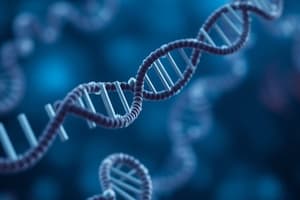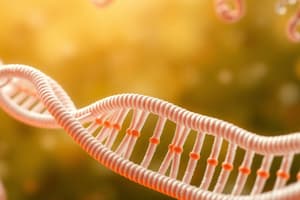Podcast
Questions and Answers
What is the primary purpose of transcription in gene expression?
What is the primary purpose of transcription in gene expression?
- To synthesize proteins directly from DNA
- To produce RNA using information in DNA (correct)
- To modify primary RNA transcripts
- To separate mRNA from ribosomes
Which of the following accurately describes the relationship between genes and proteins?
Which of the following accurately describes the relationship between genes and proteins?
- Proteins can be synthesized from multiple genes simultaneously
- Genes are meaningless without the presence of proteins
- Genes dictate protein synthesis, linking genotype to phenotype (correct)
- Genes code for RNA, which directly forms proteins
In eukaryotic cells, what occurs to primary RNA transcripts before they become functional mRNA?
In eukaryotic cells, what occurs to primary RNA transcripts before they become functional mRNA?
- They are segregated by the nuclear envelope
- They are synthesized with ribosomes
- They undergo RNA processing modifications (correct)
- They are directly translated into proteins
What distinguishes prokaryotic translation from that of eukaryotic cells?
What distinguishes prokaryotic translation from that of eukaryotic cells?
What role does RNA play in the flow of genetic information?
What role does RNA play in the flow of genetic information?
How many codons code for amino acids?
How many codons code for amino acids?
What is the role of the small ribosomal subunit in translation initiation?
What is the role of the small ribosomal subunit in translation initiation?
Which of the following triplets is known as a 'stop' signal during translation?
Which of the following triplets is known as a 'stop' signal during translation?
What is the start codon that initiates translation?
What is the start codon that initiates translation?
Which two components make up ribosomal subunits?
Which two components make up ribosomal subunits?
How does the small ribosomal subunit find the start codon during translation initiation?
How does the small ribosomal subunit find the start codon during translation initiation?
What is the function of tRNA in protein synthesis?
What is the function of tRNA in protein synthesis?
Which of the following amino acids is coded by the UUA codon?
Which of the following amino acids is coded by the UUA codon?
What stage follows the initiation of translation in the process of protein synthesis?
What stage follows the initiation of translation in the process of protein synthesis?
What is the correct sequence of the steps involved in the elongation stage of translation?
What is the correct sequence of the steps involved in the elongation stage of translation?
What initiates the termination of translation when a stop codon reaches the ribosome?
What initiates the termination of translation when a stop codon reaches the ribosome?
What does a polyribosome allow a cell to achieve during protein synthesis?
What does a polyribosome allow a cell to achieve during protein synthesis?
Which post-translational modification involves the addition of carbohydrate groups to a polypeptide?
Which post-translational modification involves the addition of carbohydrate groups to a polypeptide?
Which of the following correctly describes the folding process of polypeptides?
Which of the following correctly describes the folding process of polypeptides?
What does the Central Dogma of Molecular Biology illustrate?
What does the Central Dogma of Molecular Biology illustrate?
What is the function of RNA polymerase during transcription?
What is the function of RNA polymerase during transcription?
What sequence does the newly synthesized mRNA follow?
What sequence does the newly synthesized mRNA follow?
Which stage of transcription comes first?
Which stage of transcription comes first?
What is meant by the term 'transcription unit'?
What is meant by the term 'transcription unit'?
What does the '1 Gene 1 Polypeptide Hypothesis' state?
What does the '1 Gene 1 Polypeptide Hypothesis' state?
Where does RNA polymerase attach to begin transcription?
Where does RNA polymerase attach to begin transcription?
Which statement best describes the mRNA after RNA processing?
Which statement best describes the mRNA after RNA processing?
What is the transcription rate of RNA in eukaryotes?
What is the transcription rate of RNA in eukaryotes?
Which statement is true regarding the modifications made to pre-mRNA?
Which statement is true regarding the modifications made to pre-mRNA?
What role does the poly-A tail play in mRNA processing?
What role does the poly-A tail play in mRNA processing?
What are introns?
What are introns?
What is the primary function of spliceosomes in RNA processing?
What is the primary function of spliceosomes in RNA processing?
Which statement accurately describes ribozymes?
Which statement accurately describes ribozymes?
How do RNA synthesis and DNA synthesis differ in terms of base-pairing?
How do RNA synthesis and DNA synthesis differ in terms of base-pairing?
Which function is NOT performed by the modifications made to the mRNA molecule?
Which function is NOT performed by the modifications made to the mRNA molecule?
Which type of mutation involves replacing one nucleotide and its partner with another pair?
Which type of mutation involves replacing one nucleotide and its partner with another pair?
What is the effect of a silent mutation on the amino acid produced?
What is the effect of a silent mutation on the amino acid produced?
How many stop codons are present in the genetic code?
How many stop codons are present in the genetic code?
What is the function of codons in mRNA?
What is the function of codons in mRNA?
What can be the consequence of insertions and deletions in a gene?
What can be the consequence of insertions and deletions in a gene?
Which of the following is a start codon?
Which of the following is a start codon?
What do codons consist of?
What do codons consist of?
Which of the following amino acids is coded by the codon UGC?
Which of the following amino acids is coded by the codon UGC?
Which amino acid is coded by the codon UUU?
Which amino acid is coded by the codon UUU?
What is the significance of redundancy in the genetic code?
What is the significance of redundancy in the genetic code?
Flashcards
Gene Expression
Gene Expression
The process by which DNA directs protein synthesis.
What is a gene?
What is a gene?
A region of DNA that is transcribed into a functional product (polypeptide or RNA molecule).
Transcription
Transcription
The process by which a gene's nucleotide sequence is copied into an RNA molecule.
Translation
Translation
Signup and view all the flashcards
Messenger RNA (mRNA)
Messenger RNA (mRNA)
Signup and view all the flashcards
Gene
Gene
Signup and view all the flashcards
RNA Polymerase
RNA Polymerase
Signup and view all the flashcards
Promoter
Promoter
Signup and view all the flashcards
RNA Processing
RNA Processing
Signup and view all the flashcards
Transcription Unit
Transcription Unit
Signup and view all the flashcards
RNA Elongation
RNA Elongation
Signup and view all the flashcards
RNA Processing: Modifications
RNA Processing: Modifications
Signup and view all the flashcards
Introns and Exons
Introns and Exons
Signup and view all the flashcards
Spliceosomes: RNA Splicing
Spliceosomes: RNA Splicing
Signup and view all the flashcards
Ribozymes
Ribozymes
Signup and view all the flashcards
Elongation (Translation)
Elongation (Translation)
Signup and view all the flashcards
Termination (Translation)
Termination (Translation)
Signup and view all the flashcards
Polyribosome (Polysome)
Polyribosome (Polysome)
Signup and view all the flashcards
Protein Folding
Protein Folding
Signup and view all the flashcards
Post-Translational Modifications
Post-Translational Modifications
Signup and view all the flashcards
What is a codon?
What is a codon?
Signup and view all the flashcards
What is translation?
What is translation?
Signup and view all the flashcards
What is a ribosome?
What is a ribosome?
Signup and view all the flashcards
What is the start codon?
What is the start codon?
Signup and view all the flashcards
What is a stop codon?
What is a stop codon?
Signup and view all the flashcards
What is the initiation stage of translation?
What is the initiation stage of translation?
Signup and view all the flashcards
What are ribosomal subunits?
What are ribosomal subunits?
Signup and view all the flashcards
What happens first during the initiation stage?
What happens first during the initiation stage?
Signup and view all the flashcards
What happens when the small ribosomal subunit reaches the start codon?
What happens when the small ribosomal subunit reaches the start codon?
Signup and view all the flashcards
Nucleotide-pair substitution
Nucleotide-pair substitution
Signup and view all the flashcards
Silent mutation
Silent mutation
Signup and view all the flashcards
Insertions and deletions
Insertions and deletions
Signup and view all the flashcards
Study Notes
Gene Expression and Protein Synthesis
- DNA contains specific nucleotide sequences
- Inherited DNA dictates protein synthesis, leading to specific traits
- Proteins link genotype (DNA) and phenotype (observable traits)
What is a Gene?
- A region of DNA that codes for a functional product (protein or RNA)
Gene Expression
- The process by which DNA directs protein synthesis
Central Dogma
- DNA → RNA → Protein
Types of RNA
- mRNA (messenger RNA): Produced in the nucleus from a DNA template, carries genetic information outside the nucleus to ribosomes.
- tRNA (transfer RNA): Found in cytoplasm, carries amino acids to ribosomes during translation; each carries only one type of amino acid
- rRNA (ribosomal RNA): Produced in nucleolus; joins with proteins to form ribosomes. Ribosomes can be free in the cytoplasm or bound to the endoplasmic reticulum.
The Genetic Code & Codons
- 20 amino acids, 4 nucleotide bases
- Three nucleotides (codon) code for each amino acid
- "Words" of genes are transcribed into 3-nucleotide "words" of mRNA
- The "words" are translated into an amino acid chain forming a polypeptide
Transcription
- One strand of DNA serves as a template to produce complementary RNA
- RNA polymerase untwists DNA and adds bases to the growing mRNA molecule.
- Three stages of transcription: initiation, elongation, termination
Details of Transcription
- RNA polymerase binds to a promoter region on DNA
- RNA polymerase untwists the DNA double helix
- RNA polymerase adds complementary RNA nucleotides to the growing RNA molecule
- RNA polymerase reaches a termination sequence, ending transcription
Elongation
- RNA polymerase synthesizes mRNA at a rate of 40 nucleotides per second in eukaryotic cells.
- RNA follows base-pairing rules: U instead of T is used.
Eukaryotic RNA Modification
- Pre-mRNA is modified before it leaves the nucleus
- Addition of a 5' cap and a poly-A tail
- Introns (noncoding segments) are removed by splicing, connecting exons (coding segments).
Splicing
- A spliceosome removes introns and joins exons of pre-mRNA in eukaryotes creating an mRNA molecule with a continuous protein coding region
RNA Splicing
- Spliceosomes, catalytic RNA molecules, perform RNA splicing
Alternative RNA Splicing
- Some genes can encode more than one kind of polypeptide depending on which segments are treated as exons during splicing; this produces more proteins than genes
Translation
- mRNA codons are read in the 5' to 3' direction
- Ribosomes catalyze the synthesis of proteins.
- tRNA brings amino acids to the ribosome, matching anticodons to mRNA codons.
- Three stages: initiation, elongation, termination
Ribosomes
- Two subunits made of rRNA and proteins
- Small subunit binds mRNA & initiator tRNA
- Large subunit catalyzes bonding
tRNA
- tRNA molecule contains an anticodon that matches a specific codon on mRNA
Polypeptide Chain Elongation
- During elongation, amino acids are added to the polypeptide chain. Three steps:
- codon recognition
- peptide bond formation
- translocation
Termination Stage
- A stop codon signals the end of translation; the release factor binds releasing the polypeptide
Polyribosomes
- Multiple ribosomes can translate a single mRNA molecule at the same time, enabling faster polypeptide synthesis.
Protein Folding & Post-Translational Modification
- Polypeptide chains fold spontaneously into 3D structures.
- Enzymes modify polypeptides (cleavage, adding carbohydrate).
- Proteins require post-translational modifications (phosphorylation) to function.
Mutations
- Mutations are changes in the genetic material of a cell or virus.
- Point mutations affect one base pair. Missense mutations result in a different amino acid being incorporated into the polypeptide chain during translation.
- Insertions or deletions can be disastrous for the protein that is coded by the mutated gene.
Studying That Suits You
Use AI to generate personalized quizzes and flashcards to suit your learning preferences.




